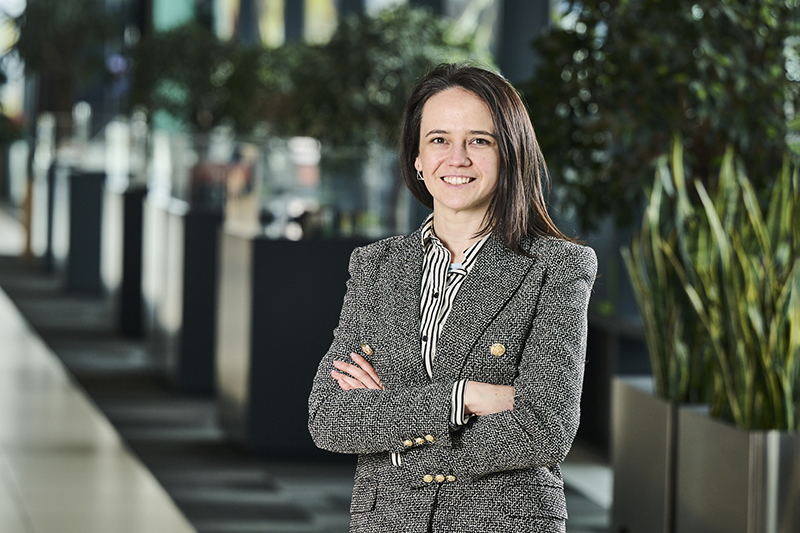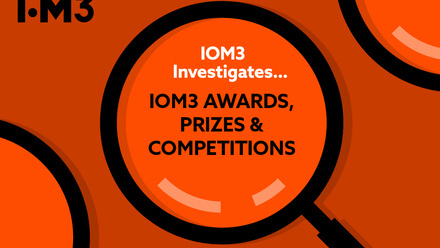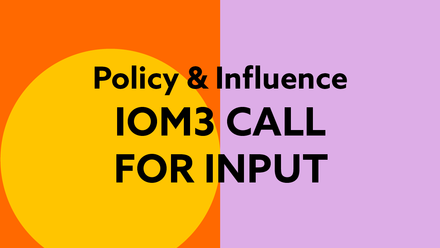Inspiring women in materials, minerals and mining, Caitlin McCall
As INWED approaches, Caitlin McCall, senior research engineer at the Manufacturing Technology Centre talks to Fiona Robinson of WIM3 about her career so far.

McCall works in the field of automation and electronics. She is a chartered member of the Institute of Mechanical Engineers and was previously a materials and manufacturing engineer at Swansea University, where she worked towards an engineering doctorate in printed electronics for flexible packaging.
In 2021, Caitlin was awarded a place in the prestigious Women in Engineering and Science Top 50 female engineers list, and we are the City Rising Star Award in 2022 for her contributions to the engineering industry. Recently she became a UN women UK delegate to better understand and contribute towards global technological and engineering challenges.
FR: Tell me a little bit about your educational background and how this influenced your choice of studies?
CM: I was fortunate to have three female science and technology teachers, they really pushed me to think about science in a different way, encouraged me to question things, pick up books that were related to the science and engineering fields and so it was them that got me thinking about engineering.
There's a scheme called Engineering Education under which the teacher linked us with a local military defence company that sponsored a project, so we got to go in and visit them and see engineers doing their thing and work with an engineer to create an underwater surveillance camera.
We did everything from material selection to building it and we presented the finished item to other students that had done similar things. It was interesting for my family as well, because I was able to take that learning home to discuss with them and show them. They didn’t know much about engineering either, so it was nice to share. And then at the end of that, I kept in discussions with the company, and they offered me a placement for the Easter break.
That was the start of it, I went on to choose mechanical engineering at university on the back of that and after my first year at university, I went back for a summer placement as well.
FR: Did you enjoy the mechanical engineering degree?
CM: I chose it because I didn't fully understand the nuances of the different types of engineering. The advice I received was that mechanical engineering is probably the broadest type, so decided to go from there. I enjoyed the practical side, engaging in projects and applying the engineering was a lot more interesting than theory.
For my third-year project, I worked with a spin-out from the university that printed electronics. We looked at printing of biosensors using roll-to-roll technologies, how you might make newspapers and things like that, to print conductive inks. And I really enjoyed it and we got to work with some bioengineers, I got exposed to loads of different technologies and machines and became pretty enamoured by it.
I did well in that project, and they offered me an engineering doctorate in the same research group.
FR: Can you tell me about your EngD project?
CM: Essentially, it's like a PhD, but you get an extra year to complete, you are based in the company, so get exposed to commercial projects as well as your doctorate research and there's a lot of freedom in the direction you take. With commercial projects you have a customer and they're looking for something quite specific, so you learn to take that into account.
We also did modules based around different research groups in the university that we were linked with, so you could understand what people were doing around you and see if collaboration was an option. There were also modules on how to publish research or how to understand IP, information on the business side of things and moving into industry or staying in academia. There were a lot of good skills built up from studying those modules.
FR: What did you move onto next?
CM: I got a job at the Manufacturing Technology Centre in Coventry; it’s partially funded by the government and has industrial funding as well. We bridge the gap between academia and industries.
These catapult centres are designed to accelerate the research that's coming out of academia and get it to a stage where companies are ready to adopt it and try to integrate that.
The one that I'm working for focuses on manufacturing in general, I focus on automation, everything from robotics to 3D printing to automated solutions and particularly printing of electronics, which is where my doctorate was.
FR: What do you consider to be your most significant achievement so far and why?
CM: I'm going to start with what's been most rewarding, I really enjoy roles where I can help others achieve their goals and get moving forward and developing, I love coaching and mentoring people so being Chair of the Women's Engineering Society (WES) Early Careers Board has been rewarding with 12 amazing engineers on that board and we do a huge range of projects. Everything from creating videos to promoting women in engineering to podcasts and competitions, and I really, really enjoy working with them.
We have one project called the Lottie Tour, where dolls are posted around the country between engineers and volunteers take them into work to portray their type of engineering this is packaged up in resource packs that we then share with children and schools.
Also, during the pandemic when the university shut down, there were a lot of resources that weren't being used. With a national shortage of PPE, a group of us got together and created a manufacturing line of face visors, we built them and distributed them in their local community. The visors were approved by the NHS and now a local company has taken that on and added it to their offerings.
And off the back of that, the most significant achievement was the recognition for these bits of work, I was awarded a place in the Women in Engineering and Science Top 50 female engineers list in 2021, and We are the City Rising Star Award in 2022.
They were really cool events to go to and meet all these amazing people that are doing incredible things and network with them.
FR: You recently volunteered as a UN women UK delegate. What does that involve?
CM: This year they had two weeks of talks and conversations, the UN invite people from all over the world to present. This year's theme was Technological Challenges and how we can utilise digitisation and digital technologies to improve the lives of women around the world.
It was a lot of listening and a lot of learning but hopefully over the year we'll be able to engage and continue to share the work that we're doing, have some projects together.
FR: You're still quite early in your career, but what's the biggest obstacle or challenge you've faced so far, and how did you overcome it?
CM: I think one of the biggest obstacles is just knowing what you want to do. What are you going to do and how do you know what's out there?
The way that I tried to navigate is by just speaking to people around me, trying to get myself out of my comfort zone on a regular basis and meeting new people from different industries as well, because I think you can get tunnel vision about your career.
FR: What are your future career plans and professional ambitions?
CM: I will continue to volunteer to support women in in engineering, and I would hope to get more involved with the Women Engineering Society.
Another thing that I'm doing is developing an online shop. A few years ago, I went to buy a friend a graduation present, and I just couldn't find anything that had engineering themes that I liked. So, I applied to the Prince’s Trust, and I got a small grant to set an online shop up, currently we've got posters and cards and some mugs as well.
FR: Is there anything else you'd recommend to someone just starting out?
CM: Network! I used to be really daunted about going out and just speaking to people because I never knew what I wanted to do and I still I felt very unsure even though I was taking the steps to go towards engineering. The thing that would have been beneficial, especially towards the early university days is reaching out and finding somebody who would help with professional presentation and terminology, helping with putting together a personal pitch.
Fiona Robinson is the faculty support manager for Computing, Engineering and Science at the University of South Wales and Vice Chair of the IOM three Women in Materials, Minerals and Mining.
To learn more about INWED follow this link.







